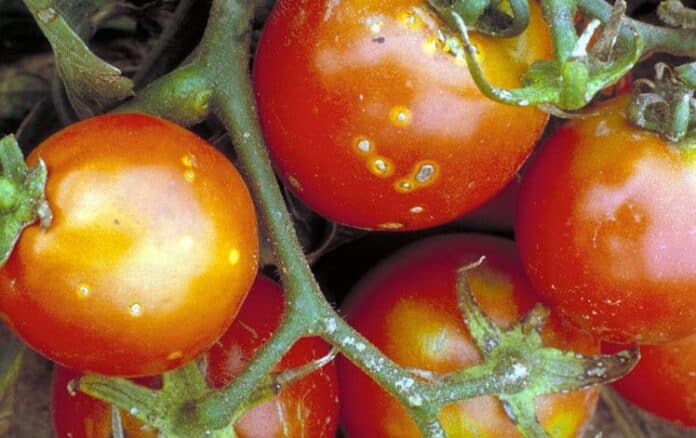Few things beat the taste of a tomato plucked straight from the garden — but even that sun-ripened treat can carry a hidden risk.
Gardeners harvesting the first of their summer bounties should practice safe produce handling, said Grace Stern, coordinator of the Virginia Cooperative Extension Master Gardener program. This includes washing hands and tools before harvest, properly cleaning produce, and keeping pets and other animals out of the garden.
“All produce should be washed,” she said. “Commercial farmers follow rules to keep animals, animal waste, and human pathogens out of their fields. Home gardeners don’t have to follow the same rules, but we should be taking similar measures to reduce our risk of getting sick.”
For example, rodents, backyard poultry, and even pets should be kept out of home garden areas. Salmonella outbreaks linked to backyard poultry occur regularly – the most recent is still ongoing as of July. When chickens and other animals are allowed to roam in food-producing gardens, their pathogens are more likely to contaminate fruits and vegetables, potentially causing foodborne illness in humans.
Stern recommends that organic gardeners follow the same precautions.
“Organic produce still needs to be washed,” Stern said. “People sometimes think that if they’re not spraying anything on their crops, there’s no need to wash it — but all produce should be washed. When label instructions are followed, the risk of illness from pesticide exposure – even with organic pesticides – is low. What usually makes us sick is the presence of a pathogen on our food. Washing is primarily important for removing pathogens that come from people or animals, and even organic produce can become contaminated by these.”
Reduce your risk of foodborne illness by cleaning tools and produce according to these guidelines:
- Before harvesting produce, wash your hands with warm water and soap for at least 20 seconds. Wash any tools, such as scissors or pruners, that will be used.
- Wash soft-skinned, delicate produce such as berries, grapes, and greens carefully under clean, running water with clean hands. Do not scrub.
- Wash thick-skinned produce, such as cucumbers, pumpkins, potatoes, winter squash, radishes, and other firm produce with a clean produce brush under clean running water.
- After washing, carefully dry fruits and vegetables with a clean cloth or paper towel. Make sure your produce brush is clean after each use.
- Do not use soap, detergent, bleach, or vinegar for washing. Produce is porous and can absorb chemicals from these cleaning agents — and from anything unsanitary in your water. Do not submerge or soak produce.
When selecting fruits and vegetables for preservation, such as canning, pickling, or freezing, take special care to choose produce free of cuts, bruises, or other damage. Bruises, cuts, or rot allow pathogens – including Clostridium botulinum, Listeria, and mold – to enter the fruit or vegetable. These bacteria can survive and multiply during canning if conditions are not properly controlled.
“Set aside the best pieces of produce for preservation,” Stern said. “If you have tomatoes with small brown spots or a dented cucumber, you can cut those spots off and eat that produce right away. For canning, you want the most perfect, blemish-free pieces you can find.”
For more information on preserving fresh produce, see Tips for preserving summer produce safely from a Virginia Cooperative Extension expert.
For more information on safe handling of homegrown produce, see the Extension publication “Do I Really Need to Wash That? A Guide to Handling Fresh Produce at Home.”
About Stern
Grace Stern serves as state coordinator of the Extension Master Gardener Program, in Virginia Tech’s School of Plant and Environmental Sciences. She previously served as a Virginia Cooperative Extension agent serving fruit and vegetable producers in Nelson County. Her research focuses on the allium leafminer, a new invasive insect pest of Allium plants like onions and garlic, in Virginia.
By Devon Johnson


